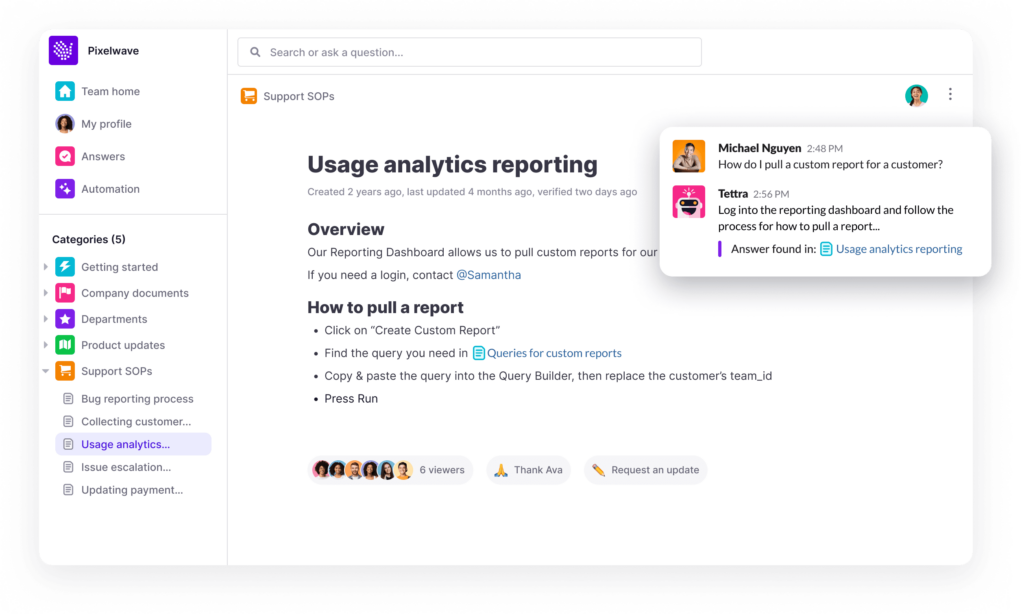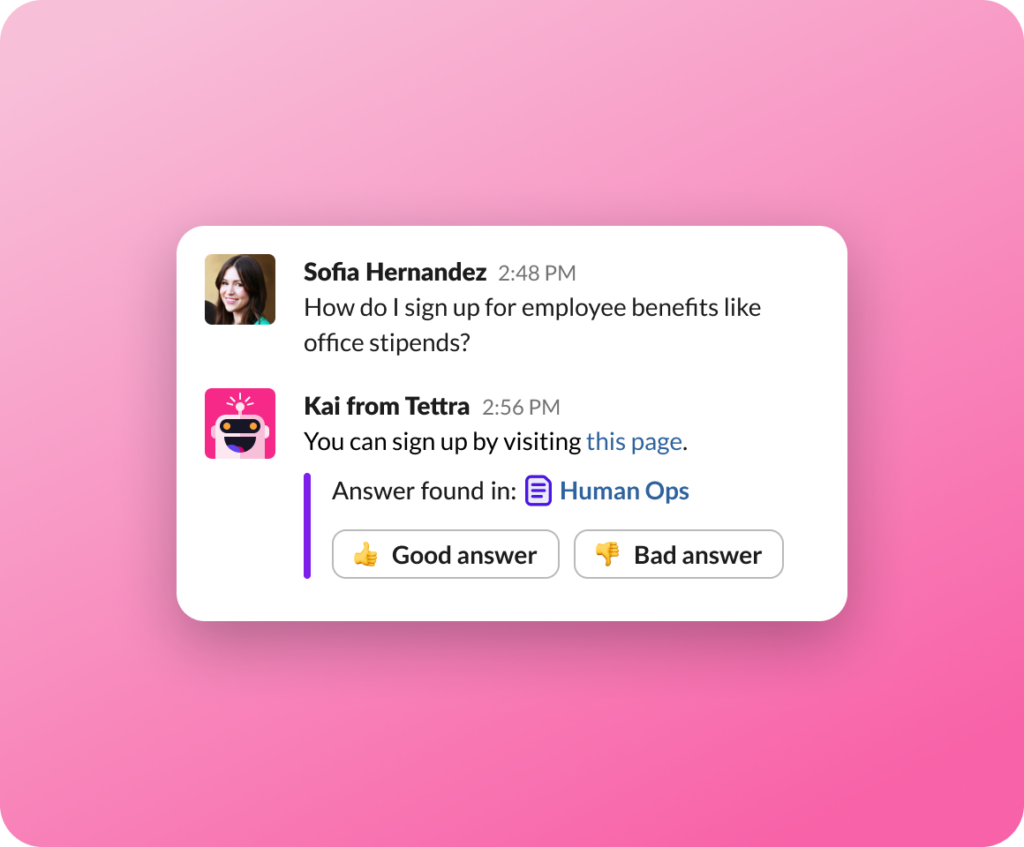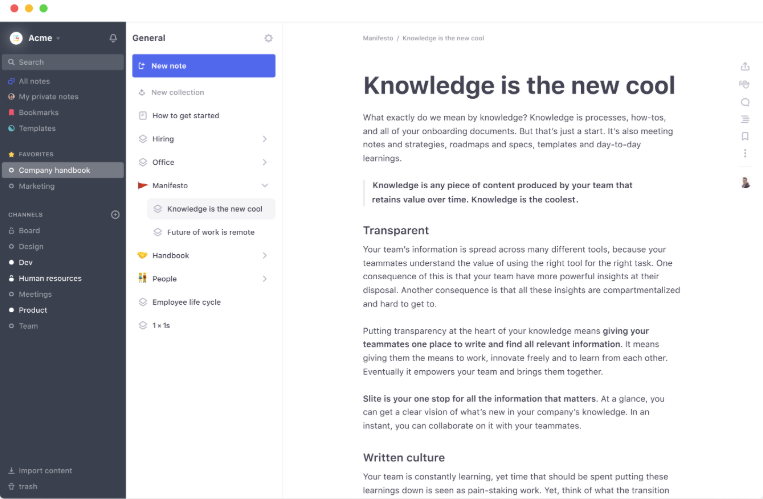Notion is a note-taking application that includes other productivity tools companies can use.
It has task management programs such as Kanban-style views, databases, tables, etc. Notion offers so much flexibility and organization. It is a relatively new product and is available on all platforms. You can get the Android, iOS, Mac, and Windows apps.
Notion offers several ways to share and collaborate with the databases and pages that you create. You can choose to share with everyone in a workspace, one person, specific groups, guests, directly on the web, and more. The permission levels are a way to assign different access levels to your pages.
After reviewing Notion for knowledge management, here are outstanding questions:
- Who on your team can decide who owns a page as a single source of truth, even after turning it into a wiki?
- How does this help you answer commonly asked questions on your team?
- What about integrations like linking to Google Docs or answering questions in Slack?
On the plus side, one of the most helpful features of Notion for knowledge management is its ability to link pages and databases.
This means you can create relationships between different pieces of information, making it easier to find what you’re looking for. (By the way, Tettra does something similar with links, embeds, and quick finds).
It supports drag and drop, page nesting, and mentions. Additionally, you can embed over 50 apps inside your Notion documents, turning your wiki into your company’s go-to-source for all types of knowledge. Finally, you can assign tasks and due dates to users, making it a wiki and project management tool in one.
If you’re intrigued by using Notion for knowledge management, but want something more definitive then check out this list of tools.
We’ll break down each of the potential Notion wiki alternatives below.
What are alternatives to Notion for knowledge management?
1. Tettra
Tettra is an internal knowledge base and knowledge management solution in one and a good alternative to Notion. Launched in 2015, it is designed to be a more modern and user-friendly alternative.
Notable features include an intuitive UI and Slack integration, allowing users to utilize the knowledge base without leaving messaging app.
With Tettra integrated with Slack, there’s a key advantage over Notion: You can answer questions right where they’re asked.
Tettra has a question and answers feature, as well as content verification which keeps knowledge base content up-to-date. There’s also Tettra’s ability to designate “knowledge experts”, who can serve as the resident expert for certain topics and verify information.
“I’ve used Confluence in the past, but I find it a bit clunky. I checked out competitors like Guru, but I really liked Tettra best from the start. Because we use Slack as well, it adapts really well to our existing channels for communication.”
Luis Hernandez, VP of Customer Success at Geckoboard

How Does Tettra compare to Notion?
- Pages and categories are on a side menu, but it’s easier to link to outside pages with Tettra than Notion. For example, you could link to a ClickUp doc or Google Drive doc with Tettra and still have it appear in the sidebar
- The same with search. Tettra has a powerful universal search that lets you find Google Drive or outside links
- Tettra has a tight integration with Slack. Your team can turn team questions into Tettra pages quickly
- No more repetitive questions

Why choose Tettra over Notion?
Based on a G2 comparison, reviewers found that Tettra has superior page analytics, offers better notifications for sharing to Slack and email, and has advanced search.
Pros:
- Intuitive interface
- Native Slack integration
- Less learning curve
- Unique knowledge management features, such as expert verification, update requests, and question/answers
Cons:
- Lacks support for forums / discussion boards
- Limited document formatting
Want to integrate Notion & Tettra?
- Integrate Notion with Tettra and find your Notion docs when you search Tettra.
- Answer questions in Tettra with Notion pages
Tettra Pricing:
- Free knowledge base up to 10 users
- Entry level – $8.33 / user per month for up to 250 users
- Enterprise – $16.66 / user per month
Click here to check out Tettra as your Notion alternative for knowledge management.
2. Nuclino
If you’re interested in Notion and Tettra, Nuclino will be familiar, too. It looks like an easy to use doc, with embeddable spreadsheet options, and various other views. Like a blend of knowledge management plus project management. Another good feature is its real-time editing support, enabling multiple users to work on the same document.
Nuclino allowed us to replace multiple other collaboration tools and consolidate all our docs and projects in one simple platform that does everything we need. It was also very easy to set up and bring the entire team on board, including non-tech people. There is virtually no learning curve at all!
– G2 Review
Pros:
- Intuitive UI and navigation
- Real-time collaboration, no need for manual refresh
- Hotkeys
- 40+ integrations
Cons:
- No access controls for individual folders or pages
- No Excel integration, only Google Sheets
Cost:
- Standard – $5 per user / month with 10gb allocation
- Premium – $10 per user / month with 20gb allocation, team insights, and advanced security controls
3. You Need a Wiki
If you’re on Google Drive and are considering Notion, you can stay with Google Drive if you want. You Need A Wiki integrates seamlessly with Google Drive, so you can start using it right away. Plus, its intuitive design means you won’t have to deal with the clunky UI of most other software.
It’s simply an add-on for the Google Drive API.
Of course, there are a few things to keep in mind when using YNAW. For one, it assumes that you’re using Google Drive as the repository for all of your company information. If you’re not already doing this, you may need to spend some time transferring documents and processes over. Additionally, while YNAW is great for navigation and search, it may not have all the advanced features you’re used to in other knowledge management software.
Pros:
- Fast setup
- No learning curve
Cons:
- Limited to Google Drive
- Harder to link to other tools
- No Slack or Teams integration
Cost:
- 1 user – free
- 10 users – $10 / month
- 25 users – $49 / month
- 75 users – $99 / month
4. Slite
One of the best things about Slite is its company wiki template. Instead of starting from scratch, Slite provides you with an example of what your wiki page could look like.
This way, you can hit the ground running and structure your wiki in a way that makes sense for your team. And with Slite’s collaboration editor, you can work together seamlessly while keeping track of revisions and restoring previous versions.
According to a G2 comparison, Slite has better versioning history and more decision trees than Notion.
I love the simplicity of the interface, easy to learn even for non-tech-savvy people. It is also opinionated in ways that I agree with. I can tell they know exactly what we need.
–G2 Review

Pros:
- Track changes, suggest edits, and restore previous versions of documents.
- Wide variety of templates
- Integrations with Slack, Trello, Google Drive, and others
Cons:
- No API support
- Lacks cataloging / categorization functionality
- Limited formatting options
Cost
- Standard – $6.67/user per month
- Premium – $12.50 /user per month
5. ClickUp
ClickUp is naturally a project management software that has expanded into lots of other workplace needs. With its docs and embed features along with project management tools, it just depends on your personal preference for how you want to structure your information.
Notion and ClickUp seem to be on a collision course on both the doc and knowledge management side and on the project management side (think Asana and Monday). With ClickUp, you can keep your process docs alongside your task list, though it may be difficult to sort through permissions.
One unique feature that a lot of users love is ClickUp’s organizational hierarchy, which empowers users to customize their content organization.
Another plus for ClickUp is the real-time collaborative editing, allowing more than one user to work on the same document simultaneously. Text editing is also a step up over traditional knowledge management software, with a wide range of formatting options and the ability to tag team members in comments. The Embed view even allows multimedia embedding in documents, like videos, trackable tasks, and bookmarks.
Pros:
- Unique hierarchical feature
- Content and formatting rich editor
- Real-time collaborative editing
Cons:
- Mobile dashboard suffers from bugs
- UI can be a bit overwhelming
- A bit of a learning curve for new users
Cost:
- Unlimited – $5 per user / month
- Business – $12 per user / month, with Google SSO, custom exporting and unlimited teams
- Business plus – $19 per user / month, with team sharing, custom roles and permissions, and increased automations and API
6. Quip
This team collaboration solution is designed for enterprise-level use and is mostly known for its Salesforce integrations.
If your company relies heavily on Salesforce for record keeping and sales, this is probably a knowledge management solution worth checking out.
However, it does more than typical knowledge management — really it’s trying to be a Google Docs or Microsoft Office replacement. It has documents, slides, and chat.
But all of that is reflected in its higher price beyond what is normally charged for Notion. If your company is all-in on Salesforce, then the price tag may not matter.
Pros:
- Full Salesforce integration
- Familiar UI
Cons:
- Expensive
- Syncing issues
- All-in-one can be daunting
Cost:
- Starter – $12 per user / month (down to $10 for annual subscription)
- Plus – $25 per user / month with custom live apps, SSO, and enterprise API
- Advanced – $100 per user / month Salesforce live editing, 2-way data syncing, and service use cases
7. Confluence
Confluence is a wiki software platform designed for knowledge management. It is one of the oldest wiki solutions, having launched in 2004 but still remaining strong today.
Atlassian owns Confluence, the parent company of other project management and productivity tools like JIRA and Trello. This makes Confluence the top choice for companies that already use those tools.
Confluence uses “spaces”, which are essentially workspaces for teams. Each space can house its own knowledge base, documents, project trackers, and more.
As of 2023, Confluence has four price tiers: free, standard, premium, and enterprise.
Overall, Confluence is very difficult to use across the whole organization because of its clunky UI and navigation. Also, it has a few drawbacks in knowledge creation, especially around edit and update tracking.
Finding the Right Notion Alternative for Knowledge Management
When choosing knowledge management software, do your research, determine what your needs are, and which vendor best fits your requirements.
- Do you need an internal knowledge base, a customer self-help portal, or an all-around productivity tool?
- Who will own the content and what will the primary teams using it?
- How large is your team, and how much of the budget can you devote to knowledge management?
- Which product possesses the functions and integrations that are critical for your business?
- Does it have a good search function?
- Can contributors submit and edit content quickly and be verified by admins or experts?
- What are its permission controls?
- Does it integrate with tools that you need?
Why Choose Tettra for Your Knowledge Base
Tettra has strong search and content management functionalities; it has good access and permission controls; it integrates with popular enterprise apps like Slack and Google Docs; all wrapped up in an easy-to-use interface that is intuitive even for non-technical users.
With Tettra, you’ll have:
- Q&A workflow to capture questions
- Knowledge base to document answers
- Knowledge management features to keep content up to date.
- Integrations with chat tools to make sure your team actually uses Tettra
Start with Tettra today. It’s simple to get started.


